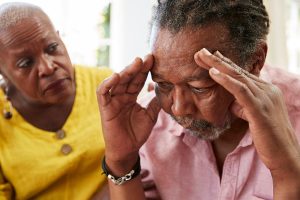With roughly 100 million stockpiled doses of coronavirus vaccine in hand, the Biden Administration is developing a plan to start offering booster shots to many Americans as early as this fall.
Among the first to receive them could be health care workers, nursing home residents and other older Americans, officials said.
On Sunday, Dr. Francis Collins, director of the U.S. National Institutes of Health, once again begged the unvaccinated to get their shots, calling them “sitting ducks” for a Delta variant infection.
“This is going very steeply upward with no signs of having peaked out,” he said on Fox News Sunday.
Federal health officials have been reviewing U.S. case numbers “almost daily” as well as the situation in countries such as Israel, where preliminary studies suggest the vaccine’s protection against serious illness dropped among those vaccinated last December or January, the Associated Press reported. Israel has been offering a coronavirus booster to people over 60 who were vaccinated more than five months ago.
In the United States, cases so far still indicate that people remain highly protected from COVID-19, including the Delta variant, after receiving the two-dose Pfizer or Moderna regimen or the one-shot Johnson & Johnson vaccine.
But, “there is a concern that the vaccine may start to wane in its effectiveness,” Collins said. “And Delta is a nasty one for us to try to deal with. The combination of those two means we may need boosters, maybe beginning first with health care providers, as well as people in nursing homes, and then gradually moving forward” with others, such as older Americans who first got vaccinations when they became available late last year.
Since the Delta variant only started hitting the United States hard in July, the “next couple of weeks” of case data will help U.S. officials make a final decision, Collins said.
Last week, the U.S. Food and Drug Administration said people with weakened immune systems can get a third dose of the Pfizer or Moderna vaccines, to better protect them as the Delta variant rages.
But more people might soon need more protection.
“If it turns out as the data come in, we see we do need to give an additional dose to people in nursing homes, actually, or people who are elderly, we will be absolutely prepared to do that very quickly,” Dr. Anthony Fauci said Sunday on CBS News’ “Face the Nation.”
While the country is now seeing an average of about 129,000 new infections a day — a 700% increase from the beginning of July — that number could soon to 200,000 in the coming weeks, a level not seen since among the pandemic’s worst days in January and February, Collins said.
About 60% of the U.S. population has gotten at least one dose and nearly 51% are fully vaccinated, according to the U.S. Centers for Disease Control and Prevention. That, in turn, has caused a shortage of intensive care unit beds, nurses and other front-line staff in areas that can no longer keep up with the flood of unvaccinated patients.
“That’s heartbreaking, considering we never thought we would be back in that space again,” Collins said. “But here we are with the Delta variant, which is so contagious, and this heartbreaking situation where 90 million people are still unvaccinated who are sitting ducks for this virus, and that’s the mess we’re in. We’re in a world of hurt.”
FDA OKs Third COVID Shot for Vulnerable Americans
The U.S. Food and Drug Administration on Thursday authorized a third “booster” shot of coronavirus vaccines for people with weakened immune systems, as the highly contagious Delta variant continues to surge across the country.
Expanding the emergency use of the Pfizer and Moderna vaccines should help protect those patients who are considered most vulnerable to COVID-19 infection. The authorization includes people who have had solid organ transplants and those whose immune systems are equally compromised, the FDA said.
The Johnson & Johnson vaccine wasn’t included in the authorization because there isn’t sufficient data yet on that vaccine, according to the agency.
With the booster dose approved, doctors will now have the leeway to give additional shots to vulnerable patients. About 3 percent of Americans have weakened immune systems for numerous reasons, from a history of cancer to the use of certain medications such as steroids.
“”The country has entered yet another wave of the COVID-19 pandemic, and the FDA is especially cognizant that immunocompromised people are particularly at risk for severe disease,” Acting Commissioner Dr. Janet Woodcock said in a statement. “After a thorough review of the available data, the FDA determined that this small, vulnerable group may benefit from a third dose of the Pfizer-BioNTech or Moderna vaccines.”
“Other individuals who are fully vaccinated are adequately protected and do not need an additional dose of COVID-19 vaccine at this time,” Woodcock added, while noting that the agency was “actively engaged in a science-based, rigorous process with our federal partners to consider whether an additional dose may be needed in the future.”
Despite the authorization, many scientists argue that the immunocompromised population is too diverse to uniformly recommend additional shots of coronavirus vaccine, The New York Times reported.
Studies do suggest that patients such as organ transplant recipients often show little immune response to the standard vaccine dosing schedule, and so they could benefit from a third jab. One recent study by Canadian researchers found that a third dose of the Moderna vaccine improved the immune response of people in that group, the Times reported.
Dr. Dorry Segev, from Johns Hopkins’ Bloomberg School of Public Health in Baltimore, has said about half of transplant patients have no antibody response to the currently authorized vaccine dosage, the Times reported. His team studied 30 transplant patients who were vaccinated but had negative or low-positive antibody [blood] titers, which pointed to a poor response by their immune systems to the shots. After an additional shot, 14 of them had higher antibody titers.
Although the vast majority of Americans who have been vaccinated got Pfizer or Moderna shots, it is not yet clear how those with immune deficiencies who received Johnson & Johnson shots are to proceed, the Times said.
Dr. Dan Barouch, a virologist at Beth Israel Deaconess Medical Center in Boston who worked with Johnson & Johnson as it developed its vaccine, said the FDA’s move to make third shots available to some with weakened immune systems made sense.
He added there was also a long and successful history of mixing and matching different vaccines for other viruses, and that could hold true for COVID vaccines. There is no data yet to determine whether protection against the virus is enhanced by such an approach, Barouch acknowledged. But researchers at the U.S. National Institutes of Health have a study underway that is expected to deliver some answers by early fall, the Times reported.
More information
The U.S. Centers for Disease Control and Prevention has more on COVID-19.
SOURCES: Associated Press; The New York Times
Source: HealthDay
Copyright © 2025 HealthDay. All rights reserved.

















